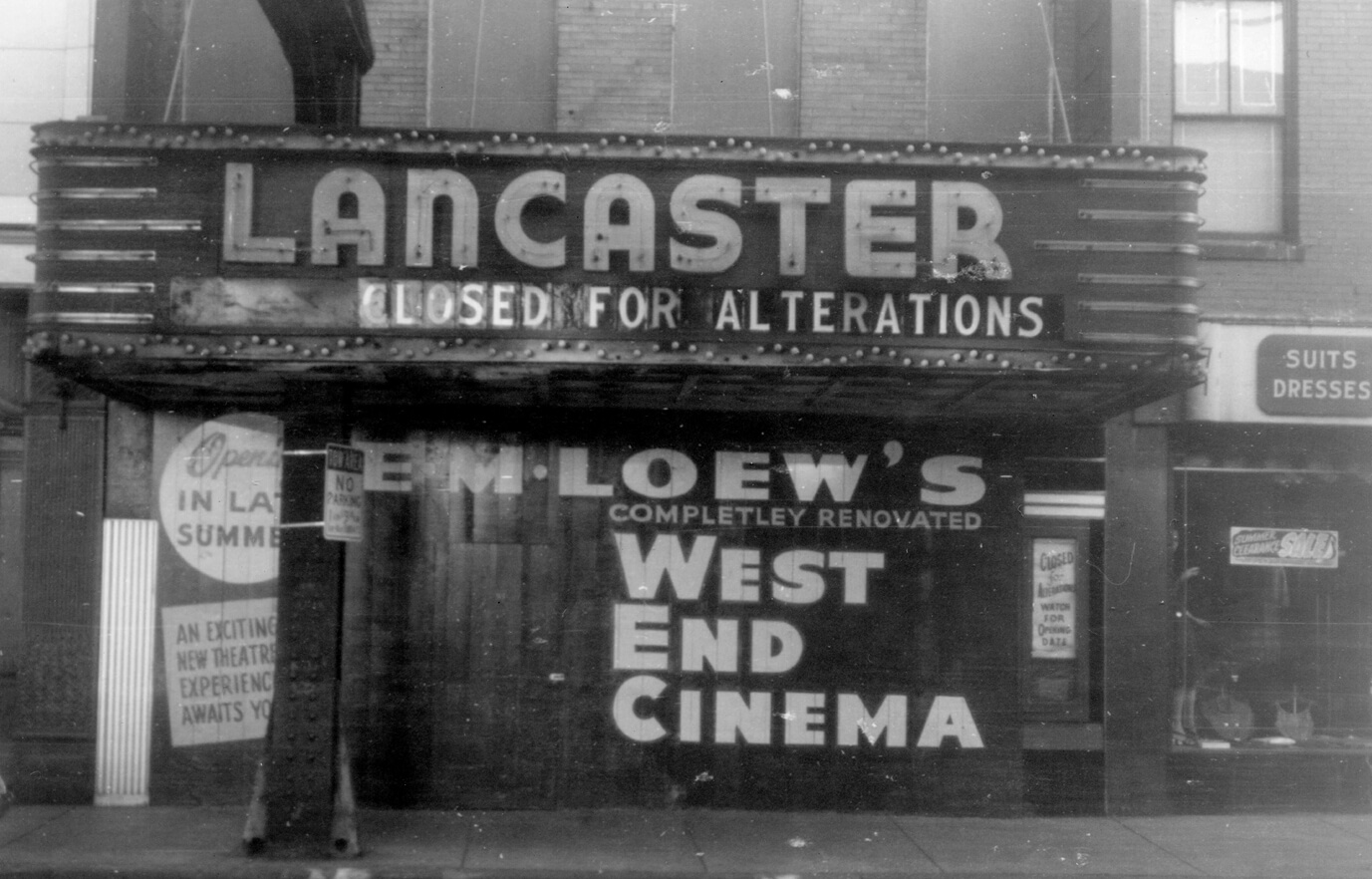Saturday at the “Lanky”
Like many fellow West Enders of her day, Dorothy Pastore relished an afternoon escape to the Lancaster Theater. There, neighborhood children from diverse backgrounds would join together and enjoy a break from the stresses of school and everyday life. Such experiences reinforced the notion of the West End as an urban village.
The building which was home to the Lancaster Theater was built in 1844 to house the Otis and then St. Mary’s Schools. For a time it served as a brass works shop, before Kenneth Sherborne bought the structure and transformed it into the Lancaster Theater. In 1926, Sherburne began showing moving pictures at his theater which before long West Enders were calling the “Lanky”. In 1963, after a major renovation, the building reopened under new management as the West End Theater, an art house which showed many foreign films. The theater was bought eight years later by the Pussycat Theater movie chain and controversially began offering adult movies. Today the former site of the Lanky is an empty lot used for parking.
Like many West Enders, Dorothy Koresky Pastore has fond, youthful memories of attending shows at the Lanky. Dorothy lived in the West End from 1929 to 1949 on Poplar, Parkman, Blossom and Staniford Streets, and attended the Girl’s High School. After she married, she and her husband moved to East Boston. What follows are Dorothy’s memories of the Lancaster Theater as told to her son, Karl.
A recording of Dorthy’s memories:
It’s Saturday morning and the neighborhood kids are lined up to get into the matinee at the Lancaster Theater, known locally as the “Lanky.” “Hey no pushing or shoving” is heard as kids jostle to pay the twenty five cents to get in. Hundreds of kids from the West End looked forward to the movies every Saturday for entertainment and distraction during the depression years. As the children entered they received – as part of their admission price – either a box of popcorn, candy bar, or a comic book – plus a ticket to the “races,” but more about that later.
As soon as they are in, there’s a rush for the coveted balcony seats. The rowdy activity of unsupervised youths is still going on when the newsreels begin (before the war, no one paid attention to the newsreels). By the time the crowd has settled down the main feature begins. (My favorites were Frankenstein, King Kong, and Snow White.) As the feature was ending it was nearing lunch time. All of a sudden you could smell every ethnic food possible as some of the kids took out the lunches that their moms made for them. My favorite memory was that of a boy named Mario. His mom made him these meatball sandwiches. Needless to say it made my mouth water…!
After the feature film there were the chapters or serials! These were exciting adventures that continued in chapter form from week to week and the chapter always ended at some cliffhanging moment – so you had to of course wait until the following week to see what happened. Everyone loved the Chapters, such as Ace Drummond and Flash Gordon to name a couple. After the chapters there might be some cartoons (Walt Disney) or the Three Stooges. At the end of the day came the races.
This was when the already overly-excited kids went really crazy. The “races” were short films of races either with old jalopies/cars or bicycles. It was a hilarious, slapstick race where the competitors each had a number. The numbers corresponded to a number on the ticket each kid received when they entered. If your ticket was the same as the winner of the race you won a prize (usually another candy bar or comic book).
The races marked the end of the Saturday Matinee and the worn out kids slowly dispersed back to their homes. The Saturday Matinee was a wonderful activity for the kids of this difficult time, giving them fun entertainment in a community setting, at a time when there weren’t many, if any, other options for entertainment. It is one of the fondest memories of my time growing up in my West End.
The Museum is grateful to Dorthy for sharing her experiences in the old neighborhood, and to her son Karl for his faithful recording.
Article by Dorothy and Karl Pastore, edited by Bob Potenza
Sources: Dorothy and Karl Pastore; www.cinematreasures.org.; thewestendmuseum.org










